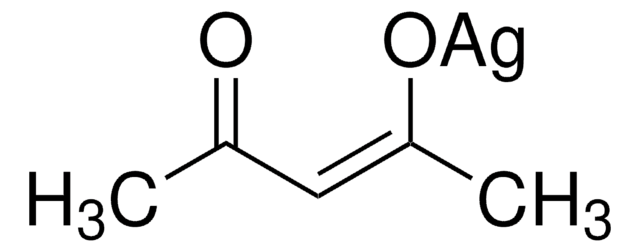514365
Copper(II) acetylacetonate
≥99.9% trace metals basis
Synonym(s):
2,4-Pentanedione copper(II) derivative, Bis(2,4-pentanedionato)copper(II), Cu(acac)2, Cupric acetylacetonate
About This Item
Recommended Products
Assay
≥99.9% trace metals basis
form
powder
reaction suitability
core: copper
mp
284-288 °C (dec.) (lit.)
SMILES string
CC(=O)\C=C(\C)O[Cu]O\C(C)=C/C(C)=O
InChI
1S/2C5H8O2.Cu/c2*1-4(6)3-5(2)7;/h2*3,6H,1-2H3;/q;;+2/p-2/b2*4-3-;
InChI key
QYJPSWYYEKYVEJ-FDGPNNRMSA-L
Looking for similar products? Visit Product Comparison Guide
General description
Application
- A precursor for atomic layer deposition of copper oxide for all-oxide photovoltaics.
- A catalyst for the aziridination of styrene.
- A catalyst for Huisgen-Click reaction to synthesize 1,2,3-triazoles.
Signal Word
Warning
Hazard Statements
Precautionary Statements
Hazard Classifications
Eye Irrit. 2 - Skin Irrit. 2 - STOT SE 3
Target Organs
Respiratory system
Storage Class Code
11 - Combustible Solids
WGK
WGK 3
Flash Point(F)
Not applicable
Flash Point(C)
Not applicable
Personal Protective Equipment
Certificates of Analysis (COA)
Search for Certificates of Analysis (COA) by entering the products Lot/Batch Number. Lot and Batch Numbers can be found on a product’s label following the words ‘Lot’ or ‘Batch’.
Already Own This Product?
Find documentation for the products that you have recently purchased in the Document Library.
Customers Also Viewed
Articles
Copper metal deposition processes are an essential tool for depositing interconnects used in microelectronic applications, giving group 11 (coinage metals: Copper, Silver, and Gold) an important place in atomic layer deposition (ALD) process development.
The diversity of applications and nanostructured materials accessible using ultrasonic spray methods are highlighted in this article.
The diversity of applications and nanostructured materials accessible using ultrasonic spray methods are highlighted in this article.
The diversity of applications and nanostructured materials accessible using ultrasonic spray methods are highlighted in this article.
Our team of scientists has experience in all areas of research including Life Science, Material Science, Chemical Synthesis, Chromatography, Analytical and many others.
Contact Technical Service














